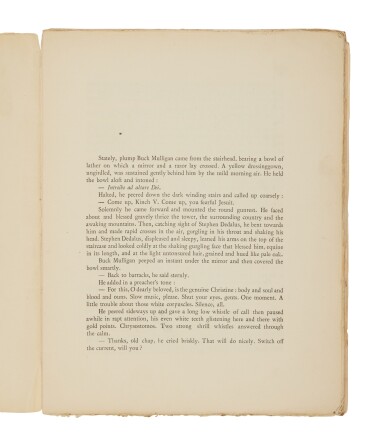Fine Books and Manuscripts
Fine Books and Manuscripts

Joyce, James | Unbound gatherings of Ulysses, with distinguished provenance
Lot Closed
December 16, 09:24 PM GMT
Estimate
100,000 - 150,000 USD
Lot Details
Description
Joyce, James
Ulysses. [Paris: Shakespeare and Company, 1922], complete set of unbound gatherings formerly in the possession of Paul L. Léon
4to, 60 individual gatherings of four and eight leaves (approximately 241 by 186 mm). Varying paper stock, 8 gatherings with autograph notation "Beach" possibly in the hand of the printer Maurice Darantière in upper right corner; some light soiling and browning, second gathering of signature 35 with tears and creases. Housed together in folding black cloth box.
A remarkable survival, and extraordinary association item — Paul L. Léon's Ulysses unbound sheets.
In addition to the three published issues of the first edition of Ulysses (copies 1-100 on Dutch handmade papers signed by Joyce; copies 101-250 on vergé d'Arches; and copies 251-1,000 on handmade paper), it appears that the publisher Sylvia Beach sent nineteen unnumbered "review" copies (fourteen of them without the wrappers) to various libraries and journalists; she also designated a number of "press copies" (perhaps as many as 19). Among the recipients of these were T.S. Eliot, Ernest Hemingway, and the Times Literary Supplement, and these were apparently stamped "PRESS COPY." Most of these were on a mixed paper stock. A few—around 6—were on vergé d'Arches, probably owing to the fact that an additional 30 copies that Beach had requested from the printer, Darantière, in September 1931, to be printed on a cheaper paper never materialized, thus forcing the printer to assemble extra signatures from the print shop floor (information from the Darantière/Beach correspondence, private collection).
From the evidence of the paper, the present set of gatherings is likely one of a very small number of copies of Ulysses made up from paper stock of the 1/100 issue, the 1/750 issue, and the extra press and review copies discussed above, which Sylvia Beach distributed to an intimate circle of friends and associates at the time of the novel's publication. The present copy, with its distinguished provenance (see below), is thus one which Beach almost certainly presented to Joyce himself at the time of publication or to Paul Léon a few years later. As with the press copies, it is quite likely that Darantière was occasionally using proof pages to complete these sets in any way possible from available stock. Gatherings show significant differences in condition with a number suggesting minor folding lengthways in the center.
Paul Léon was a Russian Jewish émigré who had escaped from the Bolsheviks in 1918. He first met Joyce in Paris in 1928, and after 1930, when Sylvia Beach gave up the rights to Ulysses, he assisted Joyce in much of his business dealings and correspondence, becoming a close friend to the author and his family, seeing him almost every day. Joyce, Leon and others would often meet at the Léons' apartment to discuss translations of Ulysses and the serial publication of Finnegans Wake. "He also transcribed and corrected manuscripts, read aloud to Joyce, took care of business and personal mail, and saw to contracts to publishers..." (Lucie Leon, James Joyce and Paul L. Leon, The Story of a Friendship). After Joyce and his family fled Paris following the outbreak of the Second World War, Léon stayed behind, conducting an extraordinarily conscientious project to rescue as many of Joyce's effects from his abandoned apartment at 34 rue de Vignes: these included many important documents and manuscripts, which after the war were exhibited at Librarie La Hune and subsequently sold to the Lockwood Library at the State University of New York at Buffalo.
Paul Léon was due to flee Paris on 21 August 1941, but—the story goes—stayed behind one extra day so that his son Alex could sit an exam. He was arrested by the Gestapo and held at an internment camp in Compiegne, before being deported to Auschwitz, where he was murdered in April 1942.
We are aware of two other sets of unbound gatherings of the novel that have appeared on the market in the last thirty-five years: one incomplete set, originally sold in 1989 and which subsequently appeared as item 44 in Glenn Horowitz's catalogue James Joyce. Books & Manuscripts (New York City 1996, $90,000), and another (allegedly complete) one, also sold in the book trade.
An extraordinary relic of a Modernist masterpiece.
REFERENCE:
Slocum & Cahoon A17
PROVENANCE:
Likely Sylvia Beach — Thence either first to James Joyce around the time of publication, or directly (after 1928) to:] — Paul Léon, James Joyce's close friend, scholar, advisor, and occasional amanuensis — Thence by descent
